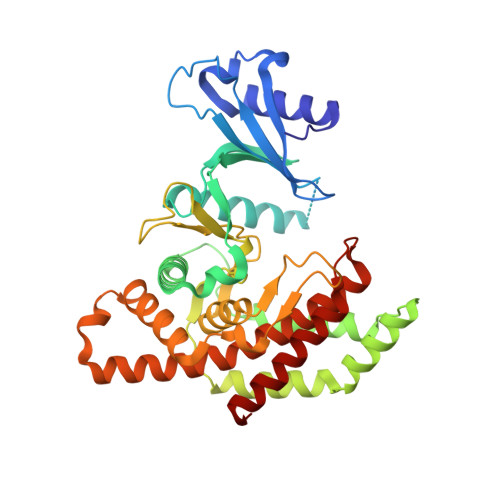Plasmodium Falciparum Choline Kinase Inhibition Leads to a Major Decrease in Phosphatidylethanolamine Causing Parasite Death.
Serran-Aguilera, L., Denton, H., Rubio-Ruiz, B., Lopez-Gutierrez, B., Entrena, A., Izquierdo, L., Smith, T.K., Conejo-Garcia, A., Hurtado-Guerrero, R.(2016) Sci Rep 6: 33189
- PubMed: 27616047
- DOI: https://doi.org/10.1038/srep33189
- Primary Citation of Related Structures:
5FUT - PubMed Abstract:
Malaria is a life-threatening disease caused by different species of the protozoan parasite Plasmodium, with P. falciparum being the deadliest. Increasing parasitic resistance to existing antimalarials makes the necessity of novel avenues to treat this disease an urgent priority. The enzymes responsible for the synthesis of phosphatidylcholine and phosphatidylethanolamine are attractive drug targets to treat malaria as their selective inhibition leads to an arrest of the parasite's growth and cures malaria in a mouse model. We present here a detailed study that reveals a mode of action for two P. falciparum choline kinase inhibitors both in vitro and in vivo. The compounds present distinct binding modes to the choline/ethanolamine-binding site of P. falciparum choline kinase, reflecting different types of inhibition. Strikingly, these compounds primarily inhibit the ethanolamine kinase activity of the P. falciparum choline kinase, leading to a severe decrease in the phosphatidylethanolamine levels within P. falciparum, which explains the resulting growth phenotype and the parasites death. These studies provide an understanding of the mode of action, and act as a springboard for continued antimalarial development efforts selectively targeting P. falciparum choline kinase.
Organizational Affiliation:
Department of Pharmaceutical and Organic Chemistry, c/ Campus de Cartuja, Faculty of Pharmacy, University of Granada, Granada, Spain.
















